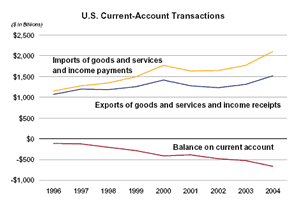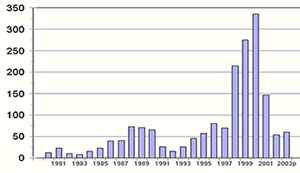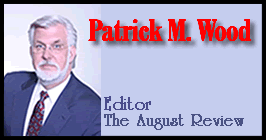Other
Wood
Articles:
Global Cities for Global Corporations
AMERICA
PLUNDERED BY GLOBAL ELITE
PART 1 of 2
Patrick
Wood
December 13, 2005
NewsWithViews.com
In 1978, this writer's book Trilaterals Over Washington revealed the global strategy of the Trilateral Commission and it's co-founders David Rockefeller and Zbigniew Brzezinski. Brzezinski, in particular, provided the intellectual reasoning and political strategy for the "New International Economic Order".
Brzezinski was also an astute political operator. He is credited as the first person to take interest in Jimmy Carter, to mentor him in globalism starting in 1973 when Carter was chosen to be part of the Trilateral Commission. Upon Carter's election victory in 1976, Brzezinski was appointed National Security Advisor. By the end of 1976, Carter had appointed no less than 19 members of the Trilateral Commission to high-ranking government positions. These 19 members represented just under 20% of the entire U.S. delegation of the Trilateral Commission.
The stage was now set for their power to become permanently embedded. Each successive Administration has been disproportionally dominated by members of the Trilateral Commission: George H.W. Bush, William Jefferson Clinton, Richard B. Cheney. Each administration filled top posts from the Trilateral Commission. Think-tanks connected to the Trilateral Commission cranked out volumes of studies that droned on and on about the New International Economic Order, interdependence and the need for political change.
Looking backward to Brzezinski, however, is necessary because he most clearly and lucidly embodied the heart and soul of the rush to globalism. He created the watershed that initiated the plundering of America and the buildup of the global corporate elite. This issue intends to quantify the extent of this plundering.
Brzezinski was interviewed in 1974 by the Brazilian newspaper Vega: "How would you define this new world order?" Brzezinski declared "...the reality of our times is that a modern society such as the U.S. needs a central coordinating and renovating organ which cannot be made up of six hundred people." In his 1969 book Between Two Ages: America's Role in the Technetronic Era, he wrote that the "nation-state as a fundamental unit of man's organized life has ceased to be the principal creative force: International banks and multinational corporations are acting and planning in terms that are far in advance of the political concepts of the nation-state."
Indeed, members of the Trilateral Commission chosen from north America, Europe and Asia (mostly Japan), are all in agreement on this point -- the nation-state only gets in the way of so-called "free trade" and therefore must be closely manipulated for their own common good. Collectively, they have taken a self-induced quantum leap above national law, into an elevated position of making their own rules as they go. We see some direct evidence of such an attitude, for instance, when President Bill Clinton had no particular legal qualms (or consequences) of giving (free or for money) top-secret missile technology to Communist China.
The gathering of corporate elites in the Trilateral Commission started with names such as Coca Cola, Ford Motor, Deere & Co., Hewlett-Packard, Cargill, Chase Manhattan Bank, Cummins Engine, Texas Instruments, Honeywell, Bechtel Corporation, Weyerhauser, General Motors, Boeing, and many others. Today, we see the same kind of makeup: IBM, Archer Daniels Midland (ADM), J.P. Morgan, Chase, Goldman, Sachs & Co., Pitney Bowes, GE, Citigroup, American International Group (AIF), Bank of America, Xerox and Halliburton, just to name a few.
To summarize then, the real plundering of America started with the founding of the Trilateral Commission in 1973 and the consolidation of power in 1976 with dominance over the Carter Administration. When one begins to see the pattern emerging, many unanswered questions start to clear up. Why does President George Bush so pointedly want to eliminate the U.S./Mexican border? Why the stampede to outsource American jobs, even to the hurt of our own citizens? Why do people around the world intuitively hate the World Trade Organization, NAFTA and CAFTA? (The last question suggests that the U.S. is not the only nation-state being plundered these days.) Nations are financially disintegrating while global corporations grow fantastically richer.
One might protest that the scope of this operation just too fantastic and huge to be real. This writer would remind the skeptic that U.S. history is littered with monopolistic tycoons who tried to get a lever on the societies they lived in. Monopolies are blind to politics, except when politics can be manipulated to establish or extend the monopoly. The vast majority of Americans are left completely in the dark because American mainstream media, collectively slanted toward globalism, has been dominated by the very same globalists who founded the Trilateral Commission in the first place: New York Times, Time-Warner, Chicago Sun-Times, Los Angeles Times, Foreign Policy Magazine, Comcast, CBS, Atlantic Media, The Rand Corporation, Washington Post, Dow Jones & Company, U.S. News and World Report all have direct representation on the Trilateral Commission.
The reader is encouraged to read Trilaterals Over Washington, Volumes I and II, to get a deeper sense of background on these issues. Both of these books are available in full-text versions on The August Review website.
The State of the Nation
This aarticle attempts to give the reader a background and perspective on the state of affairs of American business.
There are three factors to consider. First, there is the government itself. Second, there is private industry. Although they are very different types of entities, they both can adequately be described in terms of flows of income. Third, we will look at the transfer of ownership of U.S. based corporations to foreign ownership.
In the case of the government, there has been virtually no restraint on keeping its spending within its income. Whenever it spent outside of income-in-hand, borrowing whatever extra was needed was all too easy.
 You
can quickly see what the last 37 years look like from the chart to
the left. Prior to 1975, budget deficits were very small. The upward
trend started in earnest in 1975. A brief surplus was recorded between
1998 and 2001.
You
can quickly see what the last 37 years look like from the chart to
the left. Prior to 1975, budget deficits were very small. The upward
trend started in earnest in 1975. A brief surplus was recorded between
1998 and 2001.
Presiding presidents are purposefully not mentioned because they are irrelevant to the big picture.
It should also stand out that there are three troughs: the first "peaked" in 1986, the second in 1992 and the third in 2005. The extremity cycle is approximately 6 years long.
 The
cumulative effect of these deficits on the U.S. national debt is quite
dramatic. In 1970, the debt was well under the $1 trillion level.
Today, it stands over $8 trillion, a 10-fold increase.
The
cumulative effect of these deficits on the U.S. national debt is quite
dramatic. In 1970, the debt was well under the $1 trillion level.
Today, it stands over $8 trillion, a 10-fold increase.
To put this in personal terms, every man, woman and child in America owes $28,500 each. A family of 4 collectively owes $114,000. You might say, "But, that's the government debt, not mine!" The fact is though, we are the government. Except that taxpayers pay taxes, the federal government would have no source of income whatever.
 So,
let's take a look at the business economy now.
So,
let's take a look at the business economy now.
A trade deficit occurs when we import more than we export. A surplus occurs when the reverse is true. Whether positive or negative, the figure is called the "current account".
Since 1981, America has been in the red every single year. The curve is similar in nature to the National Debt curve: very low deficits in the 70's and early 80's, then rising dramatically during the 90's into the current decade.
In the chart to the right, you can see that the gap between imports (orange line) and exports (purple line) is widening at an increasing rate every year. The bottom curve shows the negative balance on the current account as it accumulates more and more red ink. Currently, the annualized rate of the current trade deficit is easily $700 billion.
By contrast, there were only two years in the decade of the 1970's that had small trade deficits.
In March, the Business Telegraph in London reported that the March (2005) deficit of $55 billion was well below the $60 billion that was expected by the markets.
"It's a relief," said James Glassman, senior economist at JP Morgan Chase in New York. "It does dampen the fears that there was something bad going on in the US economy."
The psychology at play here is amazing. The fact that the trade deficit for a single month is $55 billion instead of $60 billion is a cause for reassurance that nothing bad is happening to the U.S. economy? On the other hand, note that Glassman is senior economist at JP Morgan Chase bank which has been at the very core of the New International Economic Order from the beginning.
The third area to look at is transfer of ownership. Corporate mergers are everywhere. It's so confusing that most people don't have a clue who owns what anymore.
Outlays for New Investment in the United States by Foreign Direct Investors, 1980-2003
 (Source:
U.S. Bureau of Economic Analysis)
(Source:
U.S. Bureau of Economic Analysis)
During the 1960's, American business increased its ownership in the U.S. every year except one. During the 1970's, there were only 5 years that we increased our position. Since 1982, there has not been one single year where foreign investment did not outstrip our own... and dramatically so, to the tune of at least $3.8 trillion. You ask, "How can this happen?" Simple.
Mergers.
Consider a few mergers from recent history - do you recognize any of these "American" names?
Seller:
Amoco Corp - $48.17 Billion
Buyer: British Petroleum Co PLC - United Kingdom
Seller:
ARCO - $27.22 Billion
Buyer: BP Amoco PLC - United Kingdom
Seller:
Texaco-US Refining & Marketing - $3.964 Billion
Buyer: Shell Oil-Western US Business - Netherlands
Seller:
AirTouch Communications Inc. - $60.29 Billion
Buyer: Vodafone Group PLC - United Kingdom
Seller:
VoiceStream Wireless Corp - $29.40 Billion
Buyer: Deutsche Telekom AG - Germany
Seller:
Chrysler Corp - $40.47 Billion
Buyer: Daimler-Benz AG - Germany
Seller:
Harcourt General Inc - $5.60 Billion
Buyer: Reed Elsevier Group PLC - United Kingdom
Seller:
Simon & Schuster-Educ, Prof - $4.60 Billion
Buyer: Pearson PLC - United Kingdom
Seller:
Magma Copper Co
Buyer: BHP - Australia - $2.43 Billion
Seller:
John Hancock Finl Svcs Inc - $11.06 Billion
Buyer: Manulife Financial Corp - Canada
Seller:
TransAmerica Corp - $9.691 Billion
Buyer: Aegon NV - Netherlands
Seller:
SmithKline Beckman Corp - $7.922 Billion
Buyer: Beecham Group PLC - United Kingdom
These few examples are listed only to give you a flavor of the depth of penetration of foreign purchases into the core of American industry. In order to get to an aggregate of $3.8 trillion, you can hardly imagine how many billion dollar deals there have been over 20 years. In short, America is literally being sold out from under us.
Let's summarize the past 35 years now: the U.S. government has racked up over $8 trillion in debt; the current trade deficit for 2005 alone will likely exceed $700 billion (importing more than we export); $3.8 trillion of showcase American companies have been sold to foreigners.
Is something wrong with this picture?
When this writer began to do research for Trilaterals Over Washington in the late 1970's, he focused on the Trilateral Commission because it was very apparent that it was laying the groundwork for -- in their own words -- a "New International Economic Order." They assured us that the concept of the nation-state was outdated and we were moving into an era of "interdependence."
David Rockefeller and Zbigniew Brzezinski founded the Trilateral Commission in 1973. It has been composed of slightly over 300 members chosen from North America, Europe and Asia (primarily Japan). The members are literally the Who's Who of global elitists: top politicians, think-tank philosophers, industrialists and bankers.
It was clearly documented in Trilaterals Over Washington that the move toward global economic consolidation was well on its way. Twenty-five years later, we are standing under an avalanche of economic deterioration.
During these 25 years, America has literally "lost its shirt". We are technically quite bankrupt.
NEXT:
Find out in Part II what corporate profits
have done during over the same 25 year period!!!
Click
here for part -----> 2
� 2005 Patrick Wood -
All Rights Reserved
Patrick M. Wood is editor of The August Review, which builds on his original research with the late Dr. Antony C. Sutton, who was formerly a Senior Fellow at the Hoover Institution for War, Peace and Revolution at Stanford University. Their 1977-1982 newsletter, Trilateral Observer, was the original authoritative critique on the New International Economic Order spearheaded by members of the Trilateral Commission.
Their highly regarded two-volume book, Trilaterals Over Washington, became a standard reference on global elitism. Wood's ongoing work is to build a knowledge center that provides a comprehensive and scholarly source of information on globalism in all its related forms: political, economic and religious.
E-Mail: pwood@augustreview.com
Web Site: www.AugustReview.com
Looking backward to Brzezinski, however, is necessary because he most clearly and lucidly embodied the heart and soul of the rush to globalism. He created the watershed that initiated the plundering of America and the buildup of the global corporate elite.










